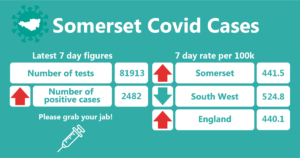Welcome to the latest edition of the weekly Somerset Covid-19 update for key stakeholders. This update is produced on behalf of the Somerset Covid-19 Engagement Board and is designed to provide a weekly update on the current Covid-19 situation in Somerset.
The number of cases of Covid-19 in Somerset has slightly increased this week but is broadly remaining stable. However, as you will have seen there has been a change to the general rules following the discovery of the Omicron variant (B.1.1.529).
This week, in response to the Omicron variant, the government has introduced some temporary laws and guidance focussing on how to prevent the spread of Covid-19. For more information, visit the GOV.uk website. The same control measures prevent the spread of Omicron as those which prevent the spread of other variants of Covid-19. The changes included a change to travel regulations with various countries being added back onto the red list, and the following, which are now temporary law:
- International arrivals from non-red list countries who are fully vaccinated will need to isolate at home and take a PCR test on or before day 2 following your arrival. You are only permitted to leave isolation if this test result is negative. If your test result is positive, you will need to isolate for 10 days.
- Face coverings are a legal requirement in shops, public transport and various other settings. A full list can be found on the GOV.uk website.
- Those who have come into close contact with an individual who has been infected with the Omicron variant will need to self-isolate for 10 days. This will apply even if you are fully vaccinated or aged 18 or under.
The Somerset Public Health team are participating in national and regional briefings, to ensure we are kept up to date with any development. Please be assured the whole team are monitoring this very closely and will communicate if and when enhanced action is required locally.
We can all reduce the risk of passing on Covid-19 by taking an LFD test before going to any events, staying away if we test positive, and isolating at home while we await a PCR test result. Please keep your distance from others, wear a face covering if in crowded or enclosed spaces and remember to wash your hands as soon as you get home. When in indoor spaces ensure there is good ventilation or meet up outside if possible.
Latest Covid Dashboard: The following link below will take you to our website: Coronavirus (COVID-19) (somerset.gov.uk) Then scroll down the page until you get to ‘COVID-19 Dashboard’ in the list. Click on this and the dashboard will open.
‘Remember, everyone can catch it, anyone can spread it’.



| David Fothergill, Leader of Somerset County Council Twitter: @DJAFothergill | Trudi Grant, Director of Public Health Twitter: @SomersetDPH | Clare Paul, Cabinet Member for Public Health and Wellbeing Twitter: @Clarepaul_ |

In the week up to 28 November, approximately 81,913 tests were carried out across the county with 2,482 new confirmed cases. The rates have increased slightly in the last reporting week to 441.5 per 100.000. This is below the South-West average but above the national average.
Hospitalisation data for Somerset remains at around 45 Covid-19 in-patients in Somerset hospitals.
This Week’s Headlines:
The main items featured in this week’s update are:
- Workplace, Care and School settings
- Vaccinations Update
- Omicron Variant
- Resources and further information
Workplaces: We are still seeing sporadic outbreaks occurring as people socialise in and around the workplace. We continue to support these settings by providing public health advice and guidance around stopping the spread and reducing transmission.
If you are holding Christmas lunches or parties think carefully about the business continuity implications. Many businesses are holding several smaller events rather than one big event. This is because of the risk of a large part of the workforce contracting Covid-19 if they are all at a single event. Remember to ask everyone to take a LFD test before attending and to stay away if the result is positive. Some activities such as singing indoors are known to carry a much higher risk of transmission if an infected person is present.
Working safely during coronavirus (Covid-19) – Guidance has been updated to reflect the changes made on 30 November. Visit the GOV.uk website for more information.
Rules on face coverings are being updated in England: Face coverings: please visit the GOV.uk website to see when you need to wear one, exemptions, and how to make your own.
From 30 November 2021, there are some places where you must wear a face covering by law, unless you are exempt or have a reasonable excuse (see the ‘When you do not need to wear a face covering’ section by following the link above).
In England, you must wear a face covering in the following indoor settings (examples are given in brackets):
- shops and supermarkets (places which offer goods or services for retail sale or hire)
- shopping centres (malls and indoor markets)
- auction houses
- post offices, banks, building societies, high street solicitors and accountants, credit unions, short-term loan providers, savings clubs and money service businesses
- estate and letting agents
- premises providing personal care and beauty treatments (barbers, hair salons, tattoo and piercing studios, nail salons and massage centres)
- pharmacies
- premises providing veterinary services
- retail galleries
- retail travel agents
- takeaways without space for consumption of food or drink on premises
- public transport (aeroplanes, trains, trams, buses, coaches and ferries), taxis and private hire vehicles
- any car or small van during a professionally delivered driving lesson, a practical driving test, or during one of the practical tests for giving driving instruction, and in all HGV lessons and tests
- transport hubs (airports, rail and tram stations and terminals, maritime ports and terminals, bus and coach stations and terminals)
When someone with Covid-19 breathes, speaks, coughs or sneezes, they release particles (droplets and aerosols) which may contain the virus which causes Covid-19. These particles can be breathed in by another person.
By covering your nose and mouth with a face covering, you’ll reduce the spread of droplets and aerosols carrying the virus by limiting the amount of the virus being released when you talk and breathe, helping to protect others.
Care Sector: Importance of Infection Prevention and Control and reporting: We are still seeing cases of Covid-19 in care settings in Somerset. Infection Prevention and Control (IPC) are crucial to prevent infections including Covid-19, as well as other respiratory infections like flu. As always, please report all cases of Covid-19 to the Health Protection Team at UK Health Security Agency (UKHSA, formerly Public Health England – PHE) who can be contacted on 0300 303 8162, option 9 for a Covid call or email them on [email protected]
Guidance on care home visiting: The guidance on care home visiting has recently been updated (25 November 2021) and includes guidance on allowing visits safely, with mitigations like testing, recommending vaccination and asking visitors not to visit if unwell (regardless of negative Covid-19 test result) or if they are a close contact of someone with Covid-19. Other aspects include support for out of home visits without isolation on return in most cases. Full details are available on the GOV.uk website.
Reconditioning / physical activity / moving more: We all know the Covid-19 pandemic has had a huge impact on our ageing population across Somerset. We have seen people move less and decrease their physical activity, as well as more social isolation and loneliness. There are a range of opportunities, services and organisations who offer social activities and ideas to improve balance and strength, improve mobility including fall prevention both at home and out in the community. More details can be found on the Somerset County Council website.
Schools and Early Years settings: Following the emergence of the Omicron variant in the UK, the Department for Education has now advised all pupils in year 7 and above, as well as staff and visitors, to wear face coverings in communal areas (including school transport).
As you will know, Directors of Public Health (DsPH) across the South West reached consensus on 25 November to continue with current Covid-19 response measures in place in educational settings, until the end of this Autumn term. Visit the SSE website for more information.
Covid-19 Testing on Return in January for all Educational and Childcare Settings in England: The DfE have requested all secondary schools must prepare to test their pupils once on-site, when they return in January.
Secondary schools will have the option to stagger the return to school for the first week to accommodate on-site testing. Schools have the flexibility to consider how best to deliver the one test on return according to their circumstances.
For settings remaining open over the Christmas period (such as private nurseries or adult education providers), staff and students should continue to test at home twice per week over the holiday period.
FE and HE students, and staff in all educational and childcare settings, should take one self-test at home either the evening or morning before they return in January. Then they should continue to test in line with government guidelines.
Staff, pupils and students should continue to test when at risk i.e. in situations when they are more likely to catch or spread Covid-19 and before visiting people who are at higher risk of severe illness if they get Covid-19.
Covid-19 Educational Webinar Every Thursday: The South-West Health Protection Team run free weekly Covid-19 educational setting webinars, which all educational settings are welcome to attend. The sessions cover infection prevention principles and then discuss scenarios to illustrate this.
Primary school testing: We continue to see a rise in cases in primary schools in Somerset, therefore it’s important to encourage, household, parent and staff LFD testing. Please also be aware the Public Health team could advise daily LFD testing for certain groups during an outbreak.
Any close or household contacts of confirmed cases of Covid-19 to book a PCR test and whilst awaiting test results, undertake a daily LFD test and only attend school if this is negative – this includes students of primary age under parental discretion. The new LFD tests are nasal swabs only and much easier to use than previous stocks.
Symptomatic and Asymptomatic Testing: For those settings closing over Christmas, all staff and students should test over the holidays in line with national guidance.
As a reminder, staff, students and parents should not retest with LFD or PCR within 90 days of a positive PCR test, unless they develop new symptoms. This could report a positive due to residual virus from that infection rather than a new infection. This is particularly important as we understand some schools are asking for a negative result to come into school after a period of self-isolation – this is not public health advice.
SCC PH advice remains consistent with national guidance:
- Only use twice weekly LFD testing for asymptomatic cases
- Make sure you do an LFD according to the instructions and at least 30 minutes after eating or drinking or vaping
- If you get a positive LFD or have symptoms get a PCR and use the supervised PCR testing route at test centre to get the best quality test
- Encourage secondary school age children to wear face coverings in crowded or enclosed places, for example on school transport. You can download posters to help encourage uptake on the SSE website
- Take up the offer of vaccination
- All contacts of suspected Omicron cases must self-isolate, regardless of their age or vaccination status. They will be contacted by NHS Test and Trace.
If you think your child is a close contact but has not been contacted directly by NHS Test and Trace then they should take a PCR test via the GOV.uk website or by calling 119.
When ordering a PCR test it is important to check the box (online) or tell 119 ‘I’ve been told to get a test by my health protection team’ and not ‘I’ve been told to get a test by my school or nursery’
Childhood Immunisation Programme: The Somerset Foundation Trust manage the childhood immunisation programme with SAINT (School Age Immunisation Nursing Team, part of the NHS). SAINT deliver the nasal flu vaccination to all schools in Somerset between October and December every year.
Immunisation sessions should still go ahead as planned when a school has a Covid-19 outbreak, unless specifically advised not to by a health protection team (HPT) or Director of Public Health (DPH). Other factors which may impact on the ability to offer immunisation sessions include the number of children still in school and whether the school has had to send some year groups home or close due to lack of staff.
SAINT will work with the school to ensure children who missed vaccinations because they were self-isolating at home or for other reasons, including exclusion, or missed consent deadline are re-offered immunisation at an appropriate time in the future.
Visit the NHS website for details on the Flu vaccination programme.
A full range of resources and information can be found on the SSE website.
Covid-19 Vaccine Programme: Following the emergence of the Omicron variant, including confirmed cases in the UK, the Joint Committee on Vaccination and Immunisation (JCVI) has urgently reviewed vaccine response measures.
JCVI now advises that: young people aged 12 to 15 years should receive a second dose of the Pfizer-BioNTech Covid-19 vaccine, no sooner than twelve weeks after the first dose. Further information on how 12-15 year olds will be able to access a second dose of the vaccine will be provided shortly.
Special school staff are eligible for Covid-19 boosters. Staff should be able to book on the National Booking System.
Where special schools only had 48 hours consent and therefore missed the deadline, pupils will be invited to Firepool in Taunton or the Haynes Motor Museum vaccination centres. Special schools will be contacted by SAINT to discuss practicalities.
Bookable slots for 12-15-year-olds
There are bookable slots for 12 -15-year-olds (who have missed their school vaccination date) at vaccination centres; Somerset Motor Museum in Sparkford and Firepool in Taunton. You can book through the National Booking Service online or by calling 119.
Please note: If your child has tested positive for Covid-19 and is not at high risk from Covid-19, they need to wait 12 weeks before they can have a Covid-19 vaccine. This starts from the date they had symptoms, or the date of the positive test if they did not have symptoms.
Vaccination Update: The government announced this week that all eligible adults in England aged 18 and over will be offered a Covid-19 booster vaccine by the end of January.
Following advice from the Joint Committee for Vaccination and Immunisation (JCVI), everyone who is currently eligible – including those aged 40 and over, health and social care workers and those at increased risk from the virus due to health conditions – will be able to book their Covid-19 booster vaccine from three months after their second dose.
The government and the NHS are urging younger people to wait until they are called forward by the NHS – with the more vulnerable continuing to be prioritised for their booster.
Younger age groups will be invited by the NHS in due course in order of age, grouped into five-year age bands.
It was also announced that, to speed up the vaccination programme, around 400 military personnel will be drafted in to support deployment, with 1,500 community pharmacy sites, additional hospital hubs, and pop-up sites opening in convenient locations across the country.
Evergreen offer: The Covid-19 vaccines are safe and effective. They give you the best protection against Covid-19.
If you haven’t had your first or second dose yet, you can still get it by booking through the NHS national booking service or by attending a walk-in clinic.
If you are eligible, you can get your vaccine at any time, even if you have been offered before but haven’t yet had it. Like any medicine, although the vaccine can cause some side effects, not everyone gets them. If you do, they are usually mild and do not last for very long. Getting the vaccine is the best protection for you and your loved ones.
To get your vaccine visit the NHS website or call 119 for an appointment. There are also convenient walk-in options across the country, which you can find on the NHS website.
Omicron Variant: The B.1.1.529 variant was first reported to the World Health Organization (WHO) from South Africa on the 24 November 2021. This variant has a large number of mutations, some of which are concerning. Preliminary evidence suggests an increased risk of reinfection with this variant, as compared to other variants. It has been confirmed that current SARS-CoV-2 PCR tests continue to detect this variant.
There are several studies underway and The Technical Advisory Group on SARS-CoV-2 Virus Evolution (TAG-VE) will continue to evaluate this variant. Based on the evidence presented, the WHO has designated B.1.1.529 as a Variant of Concern (VOC), named Omicron.
Individuals are reminded to take measures to reduce their risk of Covid-19, including proven public health and social measures such as wearing well-fitting masks, hand hygiene, physical distancing, improving ventilation of indoor spaces, avoiding crowded spaces, and getting vaccinated. Visit the World Health Organisation website for more information.
New targeted measures to respond to the emergence of the Omicron variant came into action in England on 30 November, as early indications suggest this variant may be more transmissible. These measures include:
- Compulsory face coverings in shops and on public transport
- All international foreign travel to take a Day 2 PCR test and self-isolate until they receive a negative result
- All close contacts of suspected Omicron cases must self-isolate, regardless of their age or vaccination status
In addition to the above, South Africa, Botswana, Lesotho, Eswatini, Zimbabwe, Namibia, Malawi, Mozambique, Zambia, and Angola have all been added to the UK’s travel red list.
Surge PCR testing and enhanced contact tracing are underway where cases have been identified. The UK Health Security Agency is carrying out targeted testing at locations where the positive cases were likely to have been infectious. Confirmed cases and contacts are being followed up and requested to isolate and get tested as necessary. Visit the GOV.uk website for more information.
Resources and further information: Please do keep an eye our Healthy Somerset website, which has a huge amount of information and resources to help keep everyone healthy happy and safe at this time.
For the latest local information as well as digital resources, posters and flyers please visit the Somerset County Council website.
The Somerset Local Outbreak Management Plan outlines how we, the council, will work with the NHS Test and Trace Service, PHE, the NHS and other partners to ensure a whole system approach to preventing and managing local outbreaks. This can be found here.
Finally, please like them on Facebook, follow them on Twitter and share their posts with your networks to help them in communicating these important messages. Follow their Director of Public Health Twitter account too.

